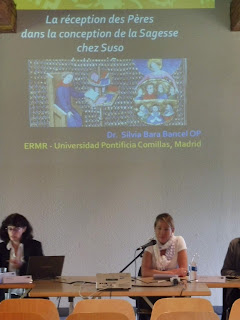On 16./17. May 2018, the two groups of French and German researchers met for their first workshop as part of the joint project, financed by the French ANR and the German DFG to explore the sources and traditions on which Meister Eckhart based his works.
The workshop questioned the anachronistic concepts of 'quotation' or 'citation', of 'reception' and 'transmission', as Eckhart shows an enormous variety of dealing with older traditions and authorities that can hardly been captured by the existing nomenclature. The project is run under the leadership of Marie-Ann Vannier (University of Lorraine, Metz) and Markus Vinzent (King's College London and Max-Weber-Kolleg, Erfurt).
The project that is running for three years will develop conceptual tools in understanding the different ways Eckhart appropriates and makes his own Patristic authorities, publish the papers of conferences, monographs on specific authors who have a particular importance in Eckhart (Origen, Augustine, Pseudo-Chrysostom, Jerome, Maximus Confessor, John of Damascus, Albertus Magnus) or for Eckhart (Nicolaus Cusanus and Henry Suso). Unfortunately, we do not have pictures of all speakers - so here the few snapshots:
The project will also create the Patristic Index for the critical edition of Eckhart's works in the Kohlhammer edition (to follow the first volume of the Bibleindex, published by Loris Sturlese and Markus Vinzent in 2015).
And, of course, we celebrated being together with typical French conviviality (for which we thank the French team and the University of Lorraine for all their hard work, preparation, organisation and finance):
The project that is running for three years will develop conceptual tools in understanding the different ways Eckhart appropriates and makes his own Patristic authorities, publish the papers of conferences, monographs on specific authors who have a particular importance in Eckhart (Origen, Augustine, Pseudo-Chrysostom, Jerome, Maximus Confessor, John of Damascus, Albertus Magnus) or for Eckhart (Nicolaus Cusanus and Henry Suso). Unfortunately, we do not have pictures of all speakers - so here the few snapshots:
Silvia Bara Bancel (Université de Madrid) and Elisabeth Boncour (Université catholique de Lyon)
Jacques Elfassi (Université de Lorraine) on Eckhart and Isidore of Seville
Jana Ilnicka (mid) on Eckhart and Boethius
Dietmar Mieth on Eckhart and the tradition of action and contemplation
Jean-Claude Lagarrigue (ERMR Strasbourg) and Julie Casteigt (Université de Toulouse II)
The project will also create the Patristic Index for the critical edition of Eckhart's works in the Kohlhammer edition (to follow the first volume of the Bibleindex, published by Loris Sturlese and Markus Vinzent in 2015).
And, of course, we celebrated being together with typical French conviviality (for which we thank the French team and the University of Lorraine for all their hard work, preparation, organisation and finance):












